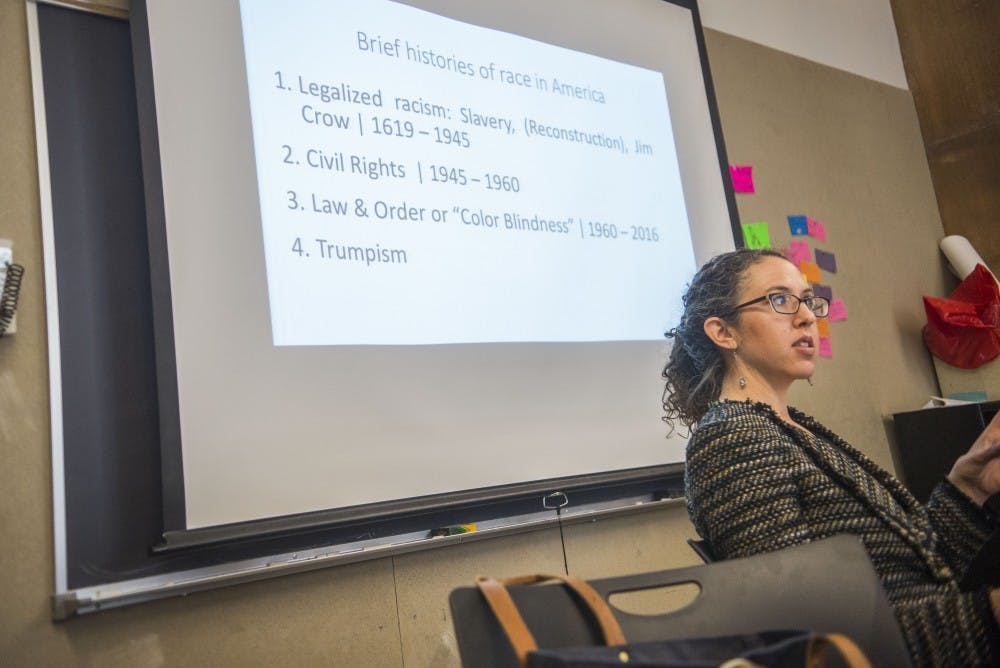Barack Obama’s historic election in 2008 signaled to many what would soon become a post-race era. However, UNM's Community Regional Planning Department is dealing with the new reality — that Donald Trump’s presidency is ushering in an era signified by an increase in racial tension.
The department hosted an “Understanding Trumpism through Racism and Whiteness” lecture for their Tuesday installment of Teach Week, a series of lectures aimed at educating community members who oppose Trump’s agenda.
“We are seeing a range of destructive and harmful policies coming out of the Trump administration,” assistant Community Regional Planning Professor Jennifer Tucker said. “We are coming together to build the conceptual framework to provide a foundation for collective action — to contest and resist the worst that is coming now.”
The purpose of the lecture was to build a historical understanding of racism in the United States to give students context to better understand the current political climate.
For the lecture, the history of the U.S. was separated into four sections: legalized racism from 1619 to 1945, the Civil Rights Movement from 1945 to 1960, law and order from 1960 to 2016, and "Trumpism" in the present day.
For the legalized racism portion, students learned about aspects of slavery and Jim Crow laws.
Tucker informed students about the civil rights movement and highlighted the resistance to it.
The law and order portion of history is signified by a bipartisan effort to reign in a “new system of control,” she said, brought on by mass incarceration and “racially sanitized language to crack down on crime.”
Tucker believes this historical framework allows people to solve current political problems. She said the United States is experiencing the return of “old discursive practices of racialized hatred being mobilized on the national political stage.”
“Trump is definitely mobilizing hate that is based on status — immigration status, religious status and racial status — to divide the American public when we should be coming together to build a better democracy,” Tucker said.
She instructed students to utilize her teachings to make historical connections and define the new era of race relations, which is counter to Trumpism.
Tucker admitted she did not have the answers, but encouraged students to collaborate to discover one.
Get content from The Daily Lobo delivered to your inbox
As the election and the discussions it has sparked since have shown, Trumpism is a broad term. A video titled “3 Truths About Trumpism,” which was presented to the class, did not provide a clear definition.
The video claimed that Trumpism is the “stockpiling of wealth and power” through whiteness, capitalism and ethnocentrism. It also relates Trumpism to post-truth politics, which is when “objective facts are less influential in shaping public opinion than appeals to emotion and personal beliefs.”
The video claimed that Trump did not win because he promised an improving economy to the white working class in the rust belt, but instead by appealing to "whiteness" and stoking racial tension.
Community regional planning students defined whiteness as a privileged status that is characterized by implicit bias toward minorities and systemic benefits to Caucasians. They claimed whiteness coincides with more property and wealth, which they said was largely produced by slavery, inequalities and the exploitation of labor.
Katie Dix, a community regional planning graduate student, said the preservation of whiteness is apparent in today’s society.
Dix pointed out the current political division, which she said is causing conflict and intense arguments between people with different political views.
“Even the idea of what an American is leads to division,” Dix said.
Lindsey Warren, another community regional planning student, emphasized the importance of taking a different approach by empathizing with others that have different political beliefs.
Warren denounced the use of character attacks against Trump supporters, stating that they passionately and truly believe their cause.
“I think the most important thing we can build on today is that it is a lot easier and better received if we come from a place of understanding instead of criticizing,” she said. “It is a lot easier to change someone’s mind if you are not attacking them, attacking their character or attacking something they truly believe.”
Andres Del Aguila is a news reporter for the Daily Lobo. He can be reached at news@dailylobo.com or on Twitter @Andres_DA95.






